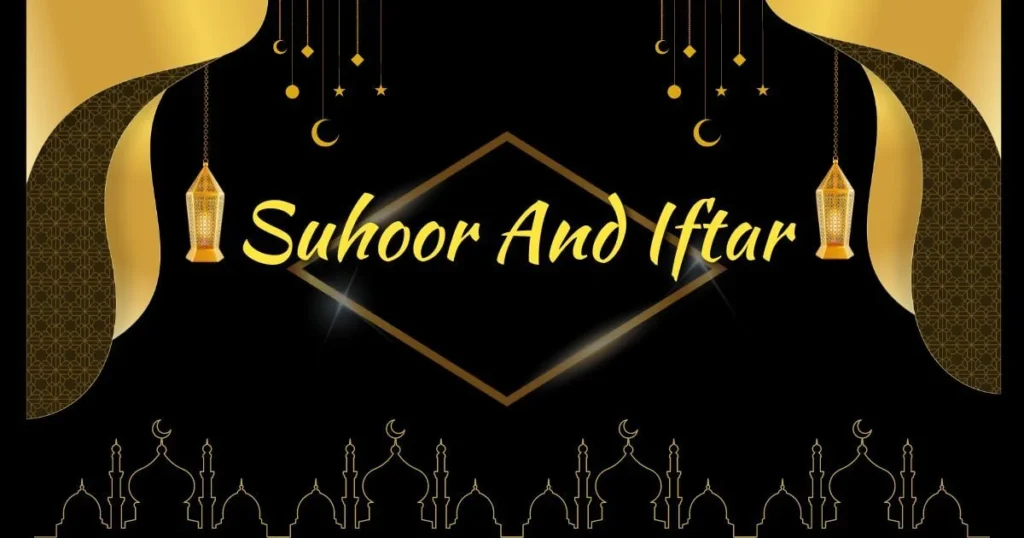
Suhoor And Iftar :
Introduction
The two main meals Muslims eat during the fasting month of Ramadan are suhoor and iftar.which tells a story of thankfulness, spiritual discipline, and community building. This extensive blog post explores the customs, prayers, and meanings connected to Iftar and Suhoor.
Suhoor Meaning
Defining Suhoor
The term “suhoor,” which comes from the Arabic word “sahr,” describes the pre-dawn meal that Muslims eat prior to the Fajr (dawn) prayer, which signals the start of the fasting day.
Spiritual Intent of Suhoor And Iftar
Suhoor is not merely a physical act of nourishment; it is a spiritual prelude to the day’s fast, embodying the Sunnah of the Prophet Muhammad (Peace Be Upon Him).
Balanced Nutrition
Suhoor places a strong emphasis on eating a well-balanced and nourishing meal to keep people going all day. It usually consists of lots of water, fruits, protein, and complex carbohydrates.
Suhoor Dua or Sehri Dua
A dua is a prayer said at the beginning of Ramadan, called variously as Sehri Dua, Dua for Suhoor, or Dua for Sehri in different areas of the world. In Hadith, there is no special dua to be said before fasting.However, what is prescribed is to say:
بِسْمِ اللهِ
In the name of Allah
Nevertheless, before beginning their fast during Ramadan, the majority of Muslims recite the Sehri Dua, or Dua for Sehri
وَبِصَوْمِ غَدٍ نَّوَيْتُ مِنْ شَهْرِ رَمَضَانَ
I intend to keep the fast for tomorrow in the month of Ramadan
Suhoor Time
Consuming Suhoor prior to the break of dawn is in line with the custom of ceasing all food consumption once the Fajr prayer commences.
Iftar Meaning
Defining Iftar
Iftar, derived from the Arabic word ‘iftara,’ means to break one’s fast. It is the evening meal that Muslims partake in after the sunset, marking the end of the day’s fast.
Breaking the Fast with Dates
The tradition of breaking the fast with dates and water follows the Sunnah of Prophet Muhammad (Peace Be Upon Him) and symbolizes the end of the fast.
Iftar Dua
A person says the Dua for Breaking Fast (Dua for Opening Fast), sometimes referred to as Iftar ki Dua or Dua for Iftar, as they break their fast during Ramadan.
ذَهَبَ الظَّمَأُ وَابْتَلَّتِ الْعُرُوقُ وَثَبَتَ الأَجْرُ إِنْ شَاءَ اللّٰهُ
Thirst is gone, the veins are moistened and the reward is certain if Allah wills.
(Abu Dawud: 2357)
The Iftar Dua given above is genuine, and the Hadith mentioned is Sahih. This Iftar Dua should be prioritized over all others. Nonetheless, there is an additional prayer that one might say when breaking their fast.
اللَّهُمَّ لَكَ صُمْتُ وَعَلَى رِزْقِكَ أَفْطَرْتُ
O Allah! For You I have fasted and upon your provision, I have broken my fast.
(Abu Dawud: 2358)
Sharing and Generosity
Families and communities share meals with friends, neighbors, and the less fortunate during iftar, which is frequently marked by deeds of kindness.
Moment of Reflection
After a day of fasting, iftar is more than just eating; it’s a time for introspection, giving thanks, and reestablishing spiritual ties.
Conclusion
The two main meals of a fasting day, suhoor and iftar, are meant to feed the body as well as the soul. These Ramadan traditions emphasize the importance of restraint, gratitude, and interpersonal connections—qualities that define this holy month. When Muslims gather for the Suhoor and Iftar ceremonies, which symbolize the spiritual journey of Ramadan, they celebrate a complex tradition that goes beyond food consumption. May the body and the soul find nourishment at every Iftar and Suhoor.
FAQS:
Iftar and suhoor are not the same thing. Iftar is the evening meal that breaks the fast, whereas suhoor is the pre-dawn meal that occurs before the fast starts.
During Ramadan, iftar is the evening meal that breaks the fast, and sahur is the meal eaten before dawn.
Suhoor is before dawn, and Iftar is at sunset.
Suhoor usually consists of a substantial and nourishing supper to help you through the fasting day.
Share on >>
